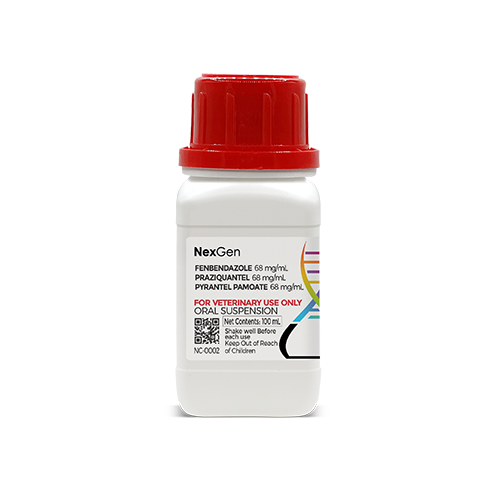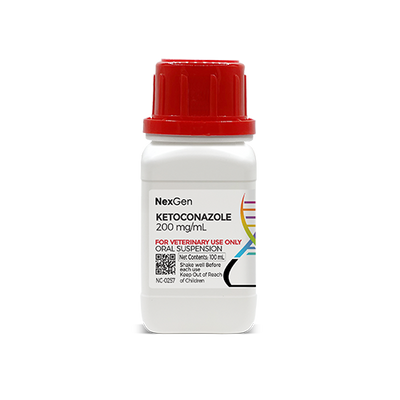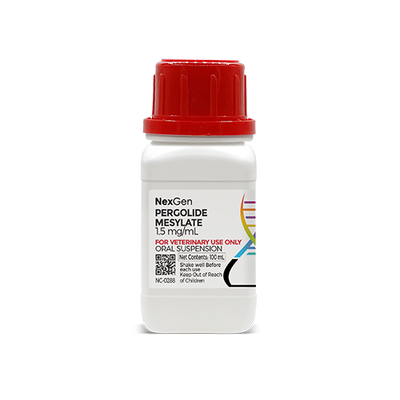
Fenbendazole 68 mg/mL + Praziquantel 68 mg/mL + Pyrantel Pamoate 68 mg/mL, Oral Suspension, 100mL
Login for pricing
- Brand
- Mixlab
- SKU:
- NC-0002
- Product Type:
- Suspension
- Size:
- 100ml
- Administration:
- Oral
Parasitic worms can live in the intestines of most species, with small numbers of worms being tolerated and causing no demonstrable effect on an animal’s overall health. Larger infestations of intestinal parasites can cause a wide range of problems however, including ill thrift, colic, digestive issues, diarrhea and death. In companion animals (primarily dogs and cats), intestinal parasites are fairly common, and are quite often treated in small animal veterinary practices.
In horses, proper pasture management and medications can assist the horse's immune system in keeping the intestinal population of worms in manageable proportions. Veterinarians and researchers have found that horses’ immune response to worms varies; thus, some horses are more susceptible to worm infestation than others. When present in low numbers, worms cause minimal problems in horses. However, when worms reach moderate or larger numbers, they can severely affect the horse’s health. In serious cases, they can damage a horse’s intestines and other internal organs, causing irreversible harm with potentially fatal consequences.
The exact method of transmission (into the horse) depends on the lifecycle of the worm. In general, eggs are ingested by the horse from an infected pasture and develop inside the horse’s digestive tract or lungs, which is where they can potentially cause disease. Eggs produced by adult worms are then shed in the horse’s feces where they can potentially infect other horses.
While a horse may appear to be in good health, it still can be infected with worms. Common signs of parasite infection in both younger and older horses can include:
- Lethargy
- Loss of weight
- Loss of condition
- Diarrhea
- Colic
- Lack of appetite
- Dull coat
The best method for confirming whether or not a horse has worms is to have your vet perform a fecal egg count and blood test. These tests confirm the species of parasite; provide an idea of how many adult worms are in the intestine; and give an estimate on how badly your pasture is infested. The blood test measures chemicals in the blood produced by inflammatory responses to the migration of the larvae.1
Classes of Medications
The classes of medications commonly used to treat worm infestations include:
- Benzimidazoles (Fenbendazole, Oxibendazole)
- Macrocyclic Lactones (Ivermectin, Moxidectin)
- Tetrahydropurimidines (Pyrantel Pamoate, Pyrantel Tatrate)
- Isquinoline-pyrozines (Praziquantel)
Fenbendazole
In horses, fenbendazole is labeled for removal of the following parasites: large strongyles (Strongylus edentatus, S equinus, S vulgaris, Triodontophorus spp), small strongyles (Cyathostomum spp, Cylicocyclus spp, Cylicostephanus spp, Cylicodontophorus spp), ascarids (Parascaris equorum) and pinworms (Oxyuris equi). Benzimidazole resistance has been noted in Cyathostomum spp found in the United States.3
Fenbendazole: Pharmacology
Fenbendazole has activity against adult life cycle stages of susceptible parasites and may have larvicidal and ovicidal activity against certain parasites.4,5
Pyrantel pamoate is FDA approved in horses for the removal of Strongylus vulgaris, S equinus, and Parasacaris equorum.6 It has variable activity against Oxyuris equi, S edentatus, and small strongyles. Pyrantel pamoate at twice the recommended dose is active against ileocecal tapeworms (eg, Anoplocephala perfoliata); however, resistance has been reported. Resistance to this medication is an ongoing concern,7 particularly for large strongyles8 and cyathostomins.9 It is recommended to perform fecal egg count reduction (FECR) testing for strongyle nematodes. A value of greater than 90% in treated horses is the suggested cutoff for determining pyrantel pamoate’s efficacy in an individual horse and on a given farm; FECR testing values less than 90% indicate resistance.10
Where to buy Fenbendazole + Praziquantel + Pyrantel Pamoate
Fenbendazole + Praziquantel + Pyrantel Pamoate is available in the U.S. through veterinary custom compounding companies.
FOR RX ONLY: A valid prescription from a licensed veterinarian is required for dispensing this medication.
3Mason ME, Voris ND, Ortis HA, Geeding AA, Kaplan RM. Comparison of a single dose of moxidectin and a five-day course of fenbendazole to reduce and suppress cyathostomin fecal egg counts in a herd of embryo transfer-recipient mares. J Am Vet Med Assoc. 2014;245(8):944-951.
4Daniels SP, Proudman CJ. Ovicidal efficacy of fenbendazole after treatment of horses naturally infected with cyathostomins. Vet Parasitol. 2016;227:151-156.
5Pittman JS, Myers GH, Stalder KJ, Karriker LA. Effect of fenbendazole on shedding and embryonation of Ascaris suum eggs from naturally infected sows. J Swine Health Production. 2015;23(5):252-263.
6Strongid T [product label]. In. Kalamazoo, MI: Zoetis Inc.; 2013.
7Peregrine AS, Molento MB, Kaplan RM, Nielsen MK. Anthelmintic resistance in important parasites of horses: Does it really matter? Vet Parasitol. 2014;201(1-2):1-8.
8Smith MA, Nolan TJ, Rieger R, et al. Efficacy of major anthelmintics for reduction of fecal shedding of strongyle-type eggs in horses in the Mid-Atlantic region of the United States. Vet Parasitol. 2015;214(1-2):139-143.
9Scare JA, Lyons ET, Wielgus KM, Nielsen MK. Combination deworming for the control of double-resistant cyathostomin parasites – short and long term consequences. Vet Parasitol. 2018;251:112-118.
10AAEP. American Association of Equine Practitioners Parasite Control Guidelines. AAEP website. https://aaep.org/sites/default/files/Documents/InternalParasiteGuidelinesFinal5.23.19.pdf. Updated May 2019.




















